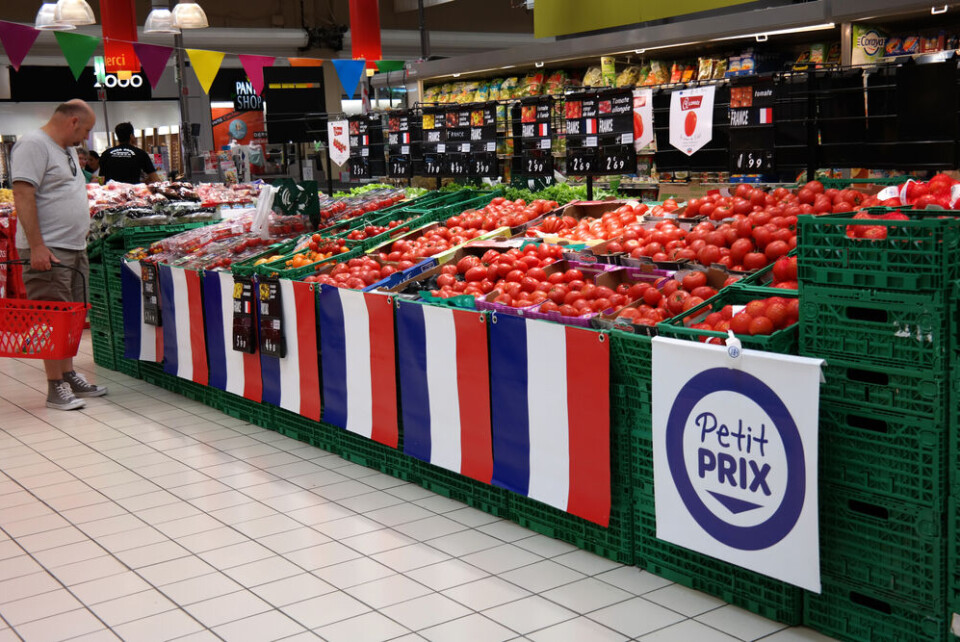-
White storks make strong return in France via nest ‘platforms’ and clipped wings
The Ligue pour la Protection des Oiseaux shares the conservation challenges in saving these birds from extinction
-
Hosting scheme in south-west France lets newcomers sample lifestyle
Households in nine Dordogne communes volunteer under Mes Nouveaux Voisins scheme
-
French boulangeries demand right for staff to work on May 1 so they can open
Artisan bakery owners can work but employees cannot, while certain industrial bakeries are allowed to remain open with workers
Shoppers in France favour budget supermarket items as inflation rises
Sales of cheaper supermarket-brand products are up 11% in the first quarter of this year, while sales of organic food fall

Budget own-brand supermarket products have been rising in popularity in France since the beginning of this year, while organic and ‘national brand’ products have become less present in shoppers’ baskets.
Sales of products with a brand name, for example Lindt or Danone, fell by 0.5% in the first quarter of the year, figures from data company NielsenIQ, experts on retail and consumer intelligence, show.
Meanwhile, sales of budget own-brand products rose by 0.1%.
And within the category of own-brand products, sales of the cheapest labels rose by 11%.
Un mot que l'on va beaucoup entendre dans les prochaines semaines suite à l'inflation : le "trading down" ou descente en gamme (de la demande conso). Se voit déjà...
— Olivier Dauvers (@Dauvers70) April 20, 2022
Via @NielsenIQFrance pic.twitter.com/KQR1GCELgc
Philippe Goetzmann, a retail expert, told BFMTV that it is linked to inflation, which is expected to reach around 5% on supermarket products this summer.
“When there is a crisis, and it results in high inflation, consumers change the way they shop,” he said.
“The same phenomenon was observed during the last financial crisis - own-brand products took market share from national brands.”
Read more:French supermarket price wars continue as shoppers try to save money
Inflation rates have risen all around Europe due in part to Russia’s invasion of Ukraine, as well as global supply chain issues linked to the Covid pandemic.
Mr Goetzmann said that in the past 10 years, households’ food budgets have been stable, while shops have been competing for lower prices and there has generally been deflation. This has allowed people to invest more in upmarket products.
“Today, the opposite is true,” he said.
Read more:Inflation rate rise triggers new minimum wage rise in France
A February study from Observatoire E.Leclerc shows that 94% of people in France buy own-brand supermarket products, and one third buy them every time they shop.
Consumer expert Pascale Hébel said the popularity of own-brand and cheaper products will continue for a while.
“The increase in pasta consumption observed after the 2007-2008 crisis lasted until 2016. You don't change your diet overnight," she said.
She added that she believes that in the long run, consumers will think more about the “type of product” they are buying, rather than the brand.
Read more:Price of toilet paper to rise significantly, says boss of E. Leclerc
Read more:Egg prices to rise sharply in France as a result of bird flu epidemic
Organic food sales level out after years of growth
The head of leading French organic supermarket chain Biocoop said that 2021 was the “first time Biocoop has seen a drop in revenue”.
Sylvain Ferry said the company posted a turnover of €1.6billion last year, which is 1% down on 2020.
Despite the slight drop, the company opened 81 new shops.
Competitor Naturalia posted turnover of €385million in 2021, a drop from the €395million in 2020. The brand has 259 shops around the country, 38 of which were opened last year.
The drop in popularity has been linked to inflation and a drop in households’ spending power. Organic products are on average 50% more expensive than non-organic ones.
Otherwise, the Covid pandemic resulted in more people favouring local products, to the detriment of organic ones that are not necessarily produced locally.
Read more:First 100% organic E.Leclerc supermarket in France closes
Mr Ferry said the company planned to combat stagnating sales by prioritising local suppliers.
He also said that they will slow down the pace of opening new shops, with around 50 new ones planned in 2022, compared to the average of 70 in previous years.
“We are also going to streamline the range of products that we stock,” he said.
“We have an average of 5,000 items per shop, which is too many.”
Related articles
Rush to stock up on oil and flour in France: sales up 55% on 2021
French supermarket Casino launches seasonal fruit and veg labels
























